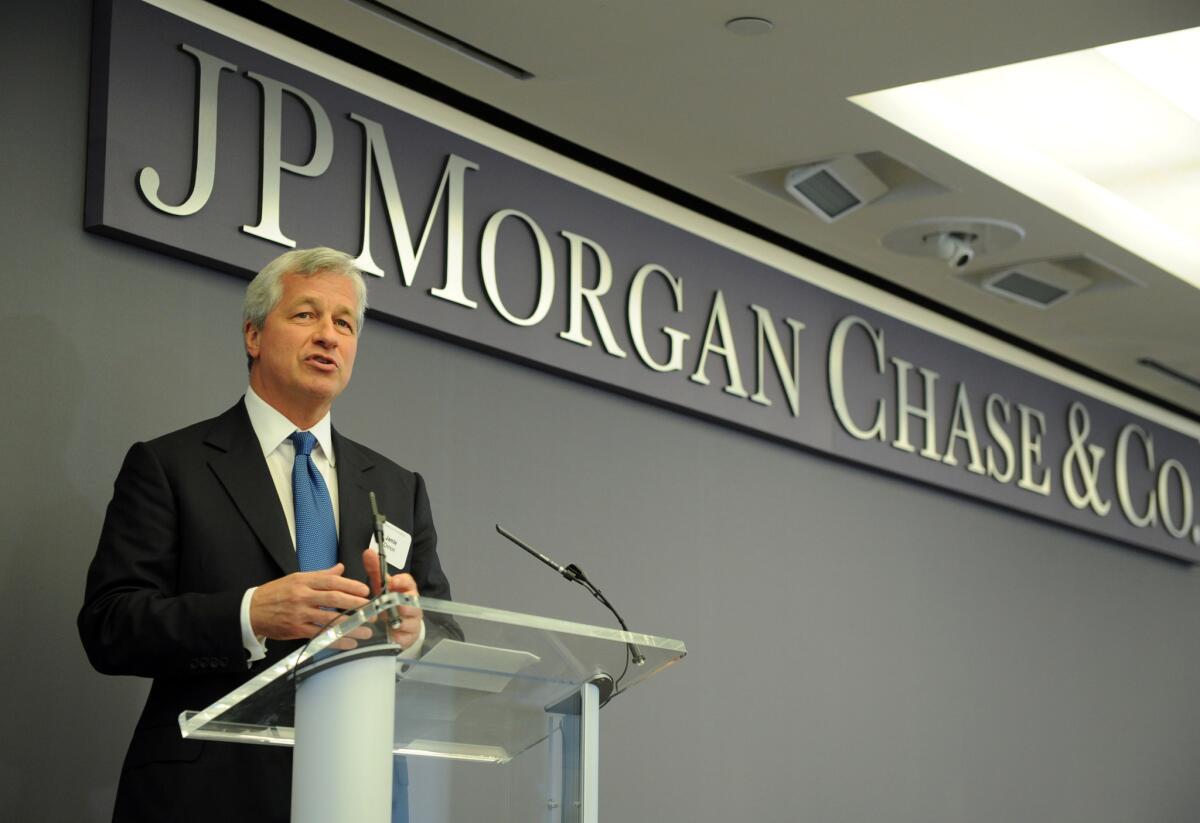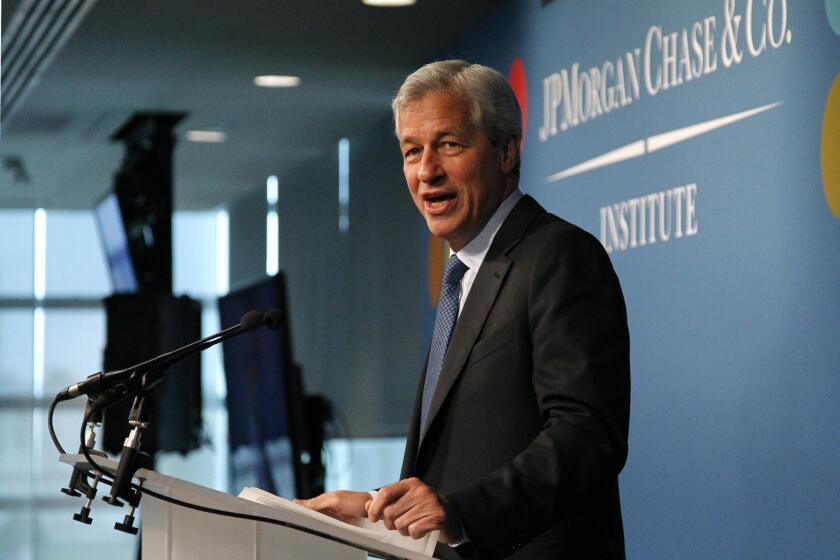Column: JPMorgan gets yet another âsweetheartâ deal from feds for flagrant market corruption

Judging from the statements put out Tuesday by federal securities regulators and the Department of Justice, JPMorgan Chase & Co. got caught in a serious, flagrant, years-long plot to rig financial markets.
The Justice Department broke the offense down into two âschemes to defraud: the first involving tens of thousands of episodes of unlawful trading in the markets for precious metals futures contracts, and the second involving thousands of episodes of unlawful trading in the markets for U.S. Treasury futures.â
Dan M. Berkovitz, a member of the Commodity Futures Trading Commission, called âthe scope of misconduct and market harm ... unparalleled.â
It is troubling enough to consistently grant waivers for criminal misconduct. This type of recidivism and repeated criminal misconduct should lead to revocations of prior waivers, not the granting of a whole new set of waivers.
— SEC Commissioner Kara Stein, in 2015
The government slammed JPMorgan with a record-breaking $920 million in fines and penalties.
Pretty serious. Yet the market watchdog organization Better Markets terms the settlement a âsweetheart deal.â
Better Markets is right. This is at least the third market manipulation accusation JPMorgan has faced in recent years, including a bid-rigging scheme in the California electricity market in 2010 and 2011 for which the bank paid a $410-million penalty.
The truth is, the latest settlement is so indulgent that the bank had no trouble casting it, absurdly, as a triumph of good governance.
The traders directly responsible for the market manipulation are âno longer with the firm,â the bankâs formal statement noted. âWe appreciate that the considerable resources weâve dedicated to internal controls was recognized by the DOJ, including enhancements to compliance policies, surveillance systems and training programs.â
The toll of JPMorgan Chaseâs relentless lawbreaking under Chairman and CEO Jamie Dimon may finally be getting real for shareholders.
Well, sure. Great surveillance and internal controls, JPMorgan. Kudos for allowing the criminality to continue for only eight years.
As if to add insult to injury, the bank bragged that it âdoes not expect any disruption of service to clients as a result of these resolutions.â
The Justice Department cut this deal as a âdeferred prosecution agreement,â or DPA, through which it wonât pursue harsher penalties if the bank keeps its nose clean for three years.
The problem here is that JPMorgan was already under a three-year sentence of probation imposed in May 2015 for manipulating the foreign exchange market, to which the bank pleaded guilty to a conspiracy count.
In that deal, the bank was forbidden to âcommit another crime in violation of the federal laws of the United States.â
Yet the offenses at the heart of this weekâs settlement date from 2008 and continued until at least January 2016, according to the prosecutorsâ statement.
In other words, the alleged crimes were taking place while the earlier settlement was being negotiated and continued for seven months after the bank promised not to break the law again.
In the 2015 settlement, JPMorgan pleaded guilty to a criminal count of conspiracy and agreed to pay $550 million in fines. Four other banks â Citicorp, Barclays, Royal Bank of Scotland and UBS â also pleaded guilty and agreed to pay a combined $2 billion in fines.
Prosecutors pledged that there would be no second chances for these offenders.
Their goal was to âcommunicate loud and clear that we will hold financial institutions accountable for criminal misconduct,â one of the prosecutors said.
âWe will enforce the agreements that we enter into with corporations,â he added. âIf appropriate and proportional to the misconduct and the companyâs track record, we will tear up an NPA [non-prosecution agreement] or a DPA and prosecute the offending company.â
You might think that the chairman and CEO of a major bank that had just pleaded guilty to a federal felony charge and has paid out more than $20 billion in legal settlements in recent years would show a little humility.
Yet here we are, five years later and with a charge of âunparalleledâ wrongdoing, and the penalty is just rolled over to another three yearsâ probation.
Some regulators have found this prosecutorial indulgence to be objectionable. In 2015, then-SEC Commissioner Kara M. Stein pointed out the ârecidivismâ of JPMorgan and the other banks.
All should have been automatically deemed ineligible for âwell-known issuer status,â a benefit conferred by the SEC that allows issuers lucrative, streamlined access to the capital markets when managing stock issues for client companies.
All received waivers from the automatic disqualification as part of the settlement â but all had received multiple waivers already. JPMorgan, Stein noted, had received five such waivers since 2008.
âIt is troubling enough to consistently grant waivers for criminal misconduct,â Stein wrote. âThis type of recidivism and repeated criminal misconduct should lead to revocations of prior waivers, not the granting of a whole new set of waivers.â
In the latest case, CFTC Commissioner Berkovitz objected to granting JPMorgan dispensation from the âbad actorâ provisions of securities laws, which raise obstacles to securities issuances by persistent wrongdoers.
Advocates of greater accountability for executives in the banking sector cheered this week when Wells Fargo Chairman and Chief Executive John Stumpf lost both his jobs.
Despite the egregious nature of JPMorganâs conduct, Berkovitz complained, the CFTC was unable to impose the âbad actorâ disqualifications itself because that was deemed to fall under the SECâs authority, with the CFTC permitted only to issue an advisory opinion to the SEC with âno legal effect.â
By absolving JPMorgan of the automatic discipline and putting off further prosecution for at least three years, the Justice Department, SEC and CFTC have meted out what Iâve previously termed âenforcement by cashierâs check.â
The sum of $920 million may sound large, but for a bank the size of JPMorgan Chase & Co. it isnât, really.
The money doesnât come out of the pockets of the wrongdoers or even Chairman and Chief Executive Jamie Dimon, who has presided over his institutionâs scofflaw ways for nearly 15 years. It comes out of the pockets of shareholders. On the other hand, theyâre not suffering either â last year alone, the bank repurchased $24 billion of their shares.
Better Markets points out that at least a portion of the penalties will be covered by insurance and a tax deduction, assuaging the pain considerably. More to the point, the bank recorded $36.4 billion in profits last year, making its settlement sum worth a mere 2.54% of its profits, or a bit more than nine days of profits.
âOnce again, JPMorgan Chase will be allowed to use shareholdersâ money to pay a fine,â Better Markets observes, âde facto buying get-out-of-jail-free cards for its executives.â
Itâs often been said that whatâs scandalous about the American system of justice isnât whatâs illegal, but whatâs legal. Whatâs truly scandalous, however, isnât whatâs illegal, but how easily those wearing white collars get away with it.
More to Read
Inside the business of entertainment
The Wide Shot brings you news, analysis and insights on everything from streaming wars to production â and what it all means for the future.
You may occasionally receive promotional content from the Los Angeles Times.












